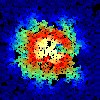Probability Seminar
We consider the problem of efficiently optimizing random (spherical or Ising) perceptron models with general bounded Lipschitz activation. We focus on a class of algorithms with Lipschitz dependence on the disorder: this includes gradient descent, Langevin dynamics, approximate message passing, and any constant-order method on dimension-free time-scales. Our main result exactly characterizes the optimal value ALG such algorithms can attain in terms of a one-dimensional stochastic control problem. Qualitatively, ALG is the largest value whose level set contains a certain "dense solution cluster." Quantitatively, this characterization yields both improved algorithms and hardness results for a variety of asymptotic regimes, which are sharp up to absolute constant factors. Joint work (in progress) with Mark Sellke and Nike Sun.
